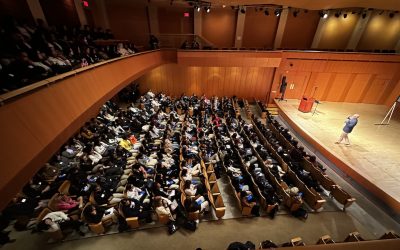Be the Inspiration. Live Your Passion.
The Master of Education program is a 30-credit advanced-degree program that focuses on theory and pedagogy. Within each specialization you will develop skills and knowledge that deepen an educator’s understanding of the field. Whether you are a K-12 educator or a higher education professional, we have a program that will help build toward your future.
Students are offered areas of specialization in a number of distinct fields. The flexible curriculum allows students to tailor their coursework to explore their interests and to build interdisciplinary knowledge. We are committed to training highly professional educators to meet the needs of diverse learners in a variety of contexts. Many courses are offered in an online format, making the program flexible.
Degree Information
Core Requirements (9 credits)
- Proseminar in Education Theory and Practice
- Teaching as Inquiry and Advocacy
- Master’s Inquiry Project
Electives (6 credits)
Taken from existing Caspersen School of Graduate Studies courses with approval by advisor.
Area of Specialization
(15 credits from one area of specialization)
ENGLISH AS A SECOND LANGUAGE
The Master of Education specialization in English as a Second Language (ESL) prepares educators to work with linguistically diverse students. The program is open to certified teachers who wish to broaden their knowledge and skills in working with diverse students or to individuals who intend to work with English as a Second Language learners in other educational contexts. The program does not lead to NJ state certification; however, currently certified teachers can pursue an endorsement in English as a Second Language as part of program coursework.
Coursework is offered in both face-to-face and online settings, creating a blended format that allows flexibility for working education professionals yet creates community on campus. The MEd program at Drew places a premium on faculty mentorship, provided by our team of dedicated full-time faculty members.
ESL Electives (15 credits, taken from the following)
- Diversity in Families, Schools, and Communities
- Methods of Teaching and Assessment in Language Classrooms
- Introduction to Linguistics and the English Language
- Second Language Acquisition
- Second Language Literacy Development
- Assessment in English as a Second Language Classrooms
NOTE: Additional courses from Caspersen School of Graduate Studies may count toward specialization with approval by advisor.
TEACHING STUDENTS WITH DISABILITIES
The Master of Education in Teaching Students with Disabilities provides K-12 teachers in New Jersey with the necessary skills and expertise to engage with diverse learners in a multitude of settings. The program is open to certified teachers who wish to broaden their knowledge and skills in working with diverse students or to individuals who intend to work with students with disabilities in other educational contexts. The program does not lead to NJ state certification; however, currently certified teachers can pursue an endorsement in Teacher of Students with Disabilities as part of program coursework.
Teaching Students with Disabilities Electives (15 credits, taken from the following)
- Diversity in Families, Schools, and Communities
- Differentiated Assessment and Instruction
- Understanding Special Populations
- Evidence-based Instructional Strategies
- Assessment of Students with Exceptional Learning Needs
- Positive Behavior Supports
- Assistive Technology and Transition Planning
NOTE: Additional courses from Caspersen School of Graduate Studies may count toward specialization with approval by advisor.
LITERACY AND TECHNOLOGY
The Master of Education specialization in Literacy and Technology will help you understand and utilize print and digital technology in authentic and meaningful ways. Reading and writing has placed increased demands on us in a digital era. Our program will help you bring real world experience and teaching practice together.
The curriculum is designed for all levels of technology users–beginners and experts alike. By the end of your time in the program you will be prepared to extend the walls of your classroom, creating connected learners prepared for an increasingly digital world.
Literacy and Technology Electives (15 credits, taken from the following)
- Literacy and Technology Electives
- Assistive Technology and Transition Planning
- Integrating Technology in Content Areas
- Special Topics in Educational Technology
- Developing Digital and Media Literacies
- Innovation in Education
- Inquiry in Literacy Instruction (NWP Summer Institute)
- Special Topics in Literacy Instruction
- Teachers as Writers
NOTE: Additional courses from Caspersen School of Graduate Studies may count toward specialization with approval by advisor.
EQUITY AND CULTURE
The Master of Education specialization in Equity and Culture explores issues of equity in society, as well as race and culture in educational contexts. The course of study promotes knowledge of various, diverse cultures and provides both breadth and depth, focusing not only on education in the United States, but also international contexts.
The program is ideal for teachers, guidance counselors, and any education professional seeking advanced study. The MEd with specialization in Equity and Culture brings serious professional training with the best of Drew’s strengths in the study of history, gender, race, and international studies. Graduates will be prepared to bring their academic work into professional practice or into a doctoral program.
Equity and Culture Required Courses (6 credits)
- Diversity in Families, Schools, and Communities
- Education Policy and Legal Issues
Equity and Culture Electives (9 credits, taken from the following)
- Inquiry in Math and Science OR Inquiry in Language & Literacy OR Historical Inquiry
- Understanding Special Populations
- Assistive Technology and Transition Planning
- Second Language Literacy Development
- Assessment in English as a Second Language Classrooms
- The Politics of Biblical Interpretation
- African American Visionaries and the Bible
- The Kin-dom of God and Social Change
- Race and American Christianity
- Religion and the Social Process
- Global Hip-Hop and Youth Activism
- Religion and the Earth
- The Search for the Good Community
- Ethically Responding to Violence Against Women
- Everyday Ethics
- Religions and Food: Feast, Fast, Farming and Famine
- Medical and Healthcare Ethics
- U.S. Popular Cultures
- Gender History
- History of Sexuality in the Contemporary West
- Anthropological Perspectives on History and Culture
NOTE: Additional courses from Caspersen School of Graduate Studies may count toward specialization with approval by advisor.
TEACHING AND LEARNING
The Master of Education specialization in Teaching and Learning provides education professionals with a foundational understanding of pedagogy. Students within this specialization will learn essential components of instructional design, student assessment, and learners’ needs. This program is especially useful for educators who do not want to pursue New Jersey state certification and want to teach in private K-12 institutions or preschools.
Teaching and Learning Electives (15 credits, taken from the following)
- The Developing Learner
- Assessment in Education
- Instructional Design
- Differentiated Assessment and Instruction
And one of the following
- Literacy for All Students in the Elementary Classroom OR Literacy and Learning in Adolescent Classrooms
NOTE: Additional courses from Caspersen School of Graduate Studies may count toward specialization with approval by advisor.
CONFLICT RESOLUTION
The program encourages professionals to facilitate conflict resolution in educational settings, whether that is in the classroom or administrative offices. By exploring historical and cultural forces around the globe, educators build in-depth knowledge about religion, nationality, heritage, and social identity as drivers of conflict, which can then be implemented in local contexts. An interdisciplinary approach offers opportunities to learn from experts in the fields of dispute resolution and law enforcement in order to understand effective conflict resolution practices in an education setting.
Conflict Resolution Required Courses (6 credits)
- Introduction to Conflict Management Practicum
- Conflict Resolution for Education Professionals
Conflict Resolution Electives (9 credits, taken from following)
- Introduction to Peace and Conflict Studies
- Advanced Conflict Management: Practicum
- The Anthropology of Peace and Conflict: World Wisdom for Conflict Resolution
- Religious Pluralism in America
- Conflict Resolution: Theoretical and Practical Foundations
- Internship: Conflict Resolution
NOTE: Additional courses from Caspersen School of Graduate Studies may count toward specialization with approval by advisor.
RELIGION, THEOLOGY AND SOCIETY
The Master of Education specialization in Religion, Theology and Society provides an opportunity for educators who desire to build a career in chaplaincy, K-12 private religious education or Christian education at churches. You will blend the study of theological traditions, religions, and society while practicing critical, ethical and constructive engagement with various faith traditions. When you graduate, you will be prepared to instruct and inspire students at religiously-affiliated private schools and in church religious education programs.
This program draws on the Drew Theological School’s tradition of innovative scholarship and courageous Christianity. The Theological School’s alumni are leaders in all facets of religious life. They are scholars, ministers, activists, and educators. The Master of Education with specialization in Religion, Theology and Society offers students the best of Drew’s two graduate schools and their shared commitment to faculty mentorship, experiential learning and intellectual community.
Christian Traditions Required Courses (9 Credits)
- Biblical Literature I: Torah, Prophets, Writings
- Biblical Literature II: Gospels, Epistles, Apocalypse
And one of the following
- Christian Ethics
- Systematic Theology
Religion and Pluralistic Society Electives (3 credits, taken from the following)
- Religion and the Social Process
- Religion and the Earth
- The Changing Religious Landscape of the United States
- Music of the World’s Religions
- Challenge of World Religions for Christian Faith and Practice
Religion and Social Justice Elective (3 credits, taken from the following)
- African American Visionaries and the Bible
- The Kin-dom of God and Social Change
- Global Hip-Hop and Youth Activism
- Christianity and Ecology
- The Search of the Good Community
- Religions and Food: Feast, Fast, Farming, and Famine
- Ethically Responding to Violence Against Women
- Religion and Incarceration
NOTE: Additional courses from Caspersen School of Graduate Studies may count toward specialization with approval by advisor.





